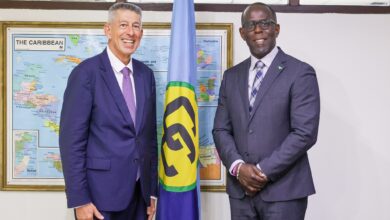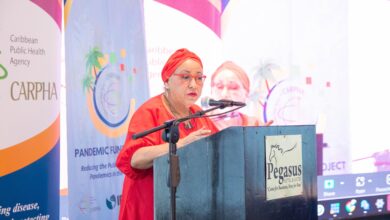Permit me to say a few words as this Meeting of the Council for Trade and Economic Development (COTED) gets underway. I first want to welcome you Madame Chair to your first meeting of the Council and to say what better place to start than at the top! I am sure that your colleagues, like myself, look forward to your guidance, as we seek to resolve the many thorny issues on the Agenda before us. Also I would like to extend a warm welcome to the Minister of Trade from Trinidad and Tobago the Honourable Mariano Browne and his counterpart from Haiti the Honourable Marie Josee Garnier. We look forward to your contributions which I am sure will enhance the deliberations of this meeting.
As I perused the Agenda for this Meeting, I could not help noticing that a number of the issues thereon have been on the Agenda of the COTED for many years. In the interest of progress of our Community, is it certainly time that such issues be resolved.
We are all aware that the global socio-economic and political environment in which CARICOM came into existence no longer exists. Indeed, to a large extent it is also different from when the decision was taken to establish the CARICOM Single Market and Economy (CSME). The forces of globalization and free trade over the past two and a half decades, and more recently the effects of the global financial and economic crisis, have wrought havoc on small vulnerable developing economies such as ours in the Caribbean Community.
The loss of preferences, especially in our European Markets, have ripped the heart out of our banana and sugar economies, and other export markets are drying up, the incessant attack on our off-shore financial sector threatens to derail one of our more successful attempts at economic diversification, the tourism industry is shaken by the recession, direct foreign investment is drying up and remittances from overseas are dwindling. Even our largest regional economy is facing a depression in energy prices. In such a situation, Caribbean integration becomes not a matter of choice but one of absolute necessity.
This was the clear and strong message sent by the Prime Minister of Jamaica, the Honourable Bruce Golding last Friday to the Council for Foreign and Community Relations when he said: “If ever there was a time when we need the sense and the strength of Community, it is now. If ever there was a time when we need to resist the latent instinct that resides inside of everyone of us in the Caribbean; that sometimes when we face trauma we can’t resist thinking that we perhaps would stand a better chance of making it if we break from the pack and try to go it alone – we have to resist that. As tedious sometimes as Caribbean consultation and Caribbean action is, we are going to have to band together in a way that we perhaps have never felt was necessary to do before.”
This reality however, demands that our CARICOM Member States change the way they do business if our fledgling Single Market is to succeed in providing a platform for export led growth. The need for firm decision-making and robust implementation measures is paramount. In recognition of this realisation, the Prime Ministerial Sub-Committee Meeting on the CSME in Antigua and Barbuda in July 2008 “agreed that precise timelines should be set for achieving Treaty compliance by those Member States which are non-compliant”. This Meeting must adhere to this commitment as we bravely seek to implement the spirit of Prime Minister Golding’s vision.
Honourable Ministers, not only is our very credibility on the line and we therefore cannot afford to be seen to be dragging our feet, but the very basic requirements of life are in danger of being beyond our grasp. Decisions must be taken now, not at the proverbial next meeting.
Before I close there are two issues to which I wish to draw attention. The first is to commend Haiti for its efforts at becoming a full member of CARICOM. Haiti has undertaken several steps in preparation for participation in the Trade in Goods Regime of the CSME and it is anticipated that once the requisite approval is obtained from its Parliament, Haiti will begin trading in goods with other CARICOM States, thereby virtually doubling the population size of the CARICOM market. The CARICOM Secretariat will continue to provide technical assistance to Haiti to facilitate its participation as an active member in the CSME.
Secondly, you will recall that at the Twentieth Inter-Sessional Meeting of the Conference which was held in Belize in March 2009, Heads of Government agreed to incorporate the Regional Negotiating Machinery (RNM) into the CARICOM Secretariat as a Specialised Department. I wish to advise that the Secretariat has been working assiduously to accomplish this task with assistance from the highest levels of the Community in an effort to ensure a smooth transition. Trade negotiations with Third Countries are critical to the development of the Single Market and Economy and hence to the Member States which comprise it. I can assure you that the skills garnered and honed over the years by our negotiators in multilateral and bilateral fora, will in large measure continue to be utilized in the best interests of the Community.
In that regard, I wish to take this opportunity to thank Ambassador Henry Gill for his outstanding contribution to the Community through his involvement in, and latterly, leadership of the Region’s negotiating process. While his departure is cause for regret, I hope that his vast experience will not be lost to the Region.
Madame Chair, Honourable Ministers, with these remarks we pledge to you, all our support and wish you all success as you lead our Council’s work over the next two days in advancing the regional Agenda.
I thank you.





